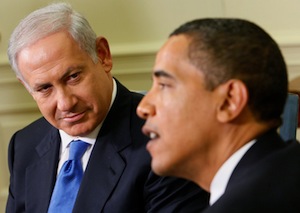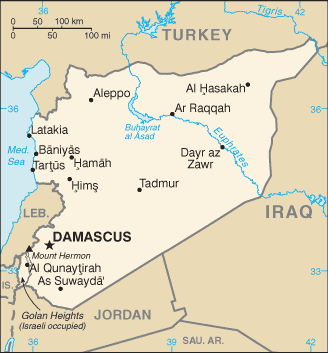Last month the US issued an ultimatum to Iran, demanding it fully cooperate with the IAEA by March or else face further action and possible measures at the UN Security Council. Micah Zenko, fellow at the Council on Foreign Relations, speculates that this “could indicate that the Obama administration is moving toward the zone of immunity logic.”
 Zenko is referring to the Israeli standard for deciding to go to war with Iran. Up to now, the Israeli standard to attack Iran is not when it has nuclear weapons or presents an imminent threat to Israel, but rather when Iran’s nuclear program is sufficiently advanced and redundant across the country – although not being weaponized – that Israeli military action would be inadequate to significantly retard it.
Zenko is referring to the Israeli standard for deciding to go to war with Iran. Up to now, the Israeli standard to attack Iran is not when it has nuclear weapons or presents an imminent threat to Israel, but rather when Iran’s nuclear program is sufficiently advanced and redundant across the country – although not being weaponized – that Israeli military action would be inadequate to significantly retard it.
The US standard, at least as commonly understood, has been a little stricter. Washington has implied it will resort to war only if Iran is demonstrably weaponizing its nuclear program and on the verge of having a nuclear bomb.
Despite the semantic differences, the two postures are essentially the same. Both the US and Israel have ignored the legal standard for resorting to war – to block an imminent attack, i.e. self-defense – and crafted their own standard, which says they can bomb Iran to smithereens if they judge that at some point in the future Iran might be able to deter US or Israeli aggression. Iran must be kept weak and defenseless, the thinking goes, otherwise we wouldn’t be able to obliterate them at will.
This speaks to Iran’s nuclear posture, which is aimed at what is sometimes called “a breakout capability.” In an environment of constant threats of war, economic sanctions, and being surrounded by the US military, Iran has tried to abstain from developing nuclear weapons while having the know-how needed to get there; this essentially is an attempt to have a deterrent without actually having a deterrent. They don’t get in trouble for having a weapon, but they are able to ward off attack or invasion.
US intelligence corroborates this analysis. As James Clapper, Director of National Intelligence, has repeatedly said, “We don’t believe they’ve actually made the decision to go ahead with a nuclear weapon.”
So if the US’s announcement of a March deadline really does indicate a gradual shift toward the more trigger-happy Israeli standard for preemption, “how would this new intelligence be presented as a justification for war?” Zenko asks. After all, “it is tough to make the case for going to war with Iran because it refused to concentrate its nuclear sites (that are under IAEA safeguards) in above-ground facilities that can be easily bombed.”
Setting a March deadline provides some certainty and perhaps coercive leverage to compel Iran to cooperate with the IAEA. But declaring deadlines also places U.S. “credibility” on the line, generating momentum to use force even if there is no new actionable intelligence that Iran has decided to pursue a nuclear weapon. Based on what we know right now, that would be a strategic miscalculation.
 A strategic miscalculation…and a savage war crime. Bombing Iran without the justification of self-defense against an imminent attack would be a war crime, a war of aggression. In the words of the Nuremberg Tribunal, “To initiate a war of aggression is not only an international crime; it is the supreme international crime, differing only from other war crimes in that it contains within itself the accumulated evil of the whole.”
A strategic miscalculation…and a savage war crime. Bombing Iran without the justification of self-defense against an imminent attack would be a war crime, a war of aggression. In the words of the Nuremberg Tribunal, “To initiate a war of aggression is not only an international crime; it is the supreme international crime, differing only from other war crimes in that it contains within itself the accumulated evil of the whole.”
And the effects of such a war of choice would certainly be evil. As a recent report by former government officials, national security experts and retired military officers concluded “achieving more than a temporary setback in Iran’s nuclear program would require a military operation – including a land occupation – more taxing than the Iraq and Afghanistan wars combined.” More taxing, not just in dollar amounts and military resources, but in lives lost.
A recent study from the University of Utah’s Hinckley Institute of Politics found, an attack that tried to take out more than four of Iran’s main enrichment facilities would cause immediate casualties of an estimated “10,000 people.” And according to a 2009 study by the Center for Strategic and International Studies “any strike on the Bushehr nuclear reactor will cause the immediate death of thousands of people living in or adjacent to the site, and thousands of subsequent cancer deaths or even up to hundreds of thousands depending on the population density along the contamination plume.” The fierce insurgency and counter-insurgency efforts that would inevitably take place, including a flood of jihadist fighters from around the world à la Iraq, would mean hundreds of thousands of lives lost.
More than that, an attack on Iran would motivate them to actually start building nuclear weapons in order to deter further aggression, bringing exactly the result the war-mongers claim they’re trying to prevent.
So why would the Obama administration ratchet up the stakes and impose an arbitrary March deadline? They claim there is a diplomatic window. As Clinton explained, “What was meant about the March reference was either about the IAEA and its continuing work or the fact that we finished our election and now would be a good time to test the proposition that there can be some good-faith serious negotiations before the Iranians get into their elections.” Elections make diplomacy harder, so yes, there is a diplomatic window. But the Obama administration may have locked themselves into a box by implicitly adopting the Israeli standard for preemptive war on Iran.









